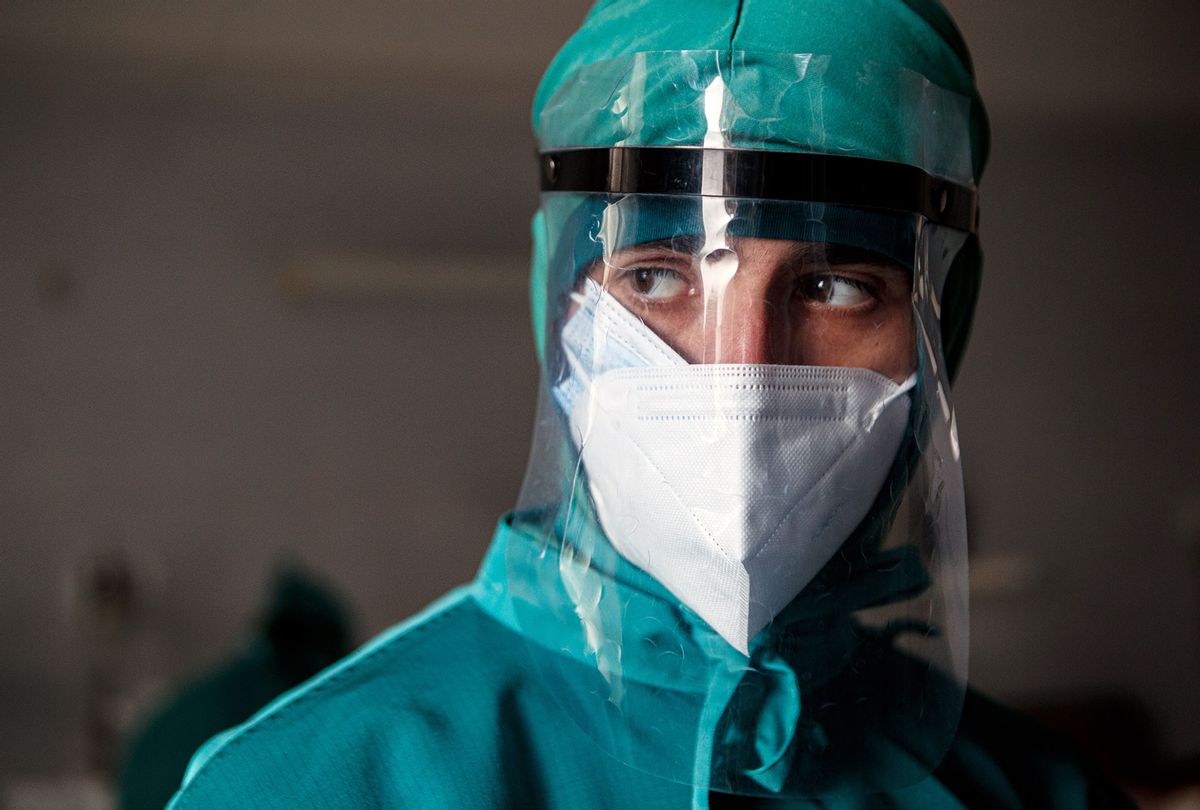The unprecedented surge in COVID-19 cases as a result of the omicron variant has created a labor shortage in California hospitals. In response, California state officials made a temporary, likely risky policy change in allowing asymptomatic healthcare workers who have tested positive for the coronavirus to return to work immediately.
"From January 8, 2022 until February 1, 2022, HCP [Health Care Personnel] who test positive for SARS-CoV-2 and are asymptomatic, may return to work immediately without isolation and without testing, and HCPs who have been exposed and are asymptomatic may return to work immediately without quarantine and without testing," the new policy states. "These HCPs must wear an N95 respirator for source control."
The guidance suggests that the healthcare workers should preferably be assigned to work with COVID-19 positive patients — but acknowledges that might not always be possible.
California is not alone among states that are suffering a worker shortage due to COVID-19. According to data from the U.S. Department of Health and Human Services posted Jan. 17, nearly 17 percent of hospitals across the country are in critical staffing shortages. The timing could not be worse, as the U.S. Surgeon General Vivek H. Murthy recently warned that the omicron surge has yet to peak, and that the U.S. should prepare for a "tough" few weeks ahead.
Understandably, this change in policy to address labor shortages has been met with a backlash from many — including, notably, many who work in a healthcare setting. The California Nurses Association (CNA) issued a strong rebuke.
Want more health and science stories in your inbox? Subscribe to Salon's weekly newsletter The Vulgar Scientist.
"Governor Newsom and our state's public health leaders are putting the needs of health care corporations before the safety of patients and workers," said CNA President Cathy Kennedy, RN, in a statement. "We want to care for our patients and see them get better – not potentially infect them. Sending nurses and other health care workers back to work while infected is dangerous. If we get sick, who will be left to care for our patients and community?"
The CNA believes this new policy will "guarantee more transmission."
According to the Centers for Disease Control and Prevention (CDC), the incubation period for COVID is between two and 14 days. The CDC notes that if a person tests positive for COVID-19 or has symptoms, regardless of vaccination status, the public health agency does recommend they isolate themselves from others in their own home for five days.
In late December, the CDC updated its isolation and quarantine guidance for healthcare workers, stating that asymptomatic workers with COVID-19 can return to work after seven days — compared to the previously recommended ten — with a negative test. However, the CDC said isolation time can be cut further if there are staffing shortages.
Not all of those who work in healthcare are concerned about the change. Dr. Monica Gandhi, infectious disease doctor and professor of medicine at the University of California, San Francisco, told Salon she believes this policy is fine.
"Of note, all health care workers in the state of California are required to be vaccinated and boosted," Gandhi said. "Moreover, this study showed that, in asymptomatic delta breakthrough infections among health care workers, even when testing positive the first day, all tested negative the next day or the following day showing asymptomatic vaccinated people unlikely to spread."
Gandhi added: "The CDC changed their quarantine guidelines anticipating healthcare worker shortages this winter and the CADPH [The California Department of Public Health] is just being consistent with these guidelines so I think this is fair." She noted that wearing N95 masks at work is an important part of the recommendation.
Dr. George Rutherford, a professor of epidemiology at the University of California, San Francisco, agreed that it was probably fine as a "last resort" given staffing shortages.
"Yes, I think it's an appropriate last resort — although I'd hesitate to do it in long-term care facilities (I understand this was not precluded by the state order)," Rutherford told Salon via email.
Amesh Adalja, a senior scholar at the Johns Hopkins Center, told Salon the highest priority "has to be [retaining] hospital staff."
"Understaffing poses a substantial risk to patients and can result in more deaths," Adalja said. He continued: "The highest priority now is to keep hospitals staffed. I do think returning asymptomatic healthcare workers who are appropriately masked to work is an appropriate intervention given the current situation. Perfect can't be the enemy of the good when hospitals are delving into crisis standards of care."
But many on the ground don't agree.
"The situation just feels so hopeless," Erin McIntosh, a rapid-response nurse at Riverside Community Hospital, told the Los Angeles Times. "I went into healthcare wanting to help people, but now I'm the vector. Someone is coming to me in their time of need, and I could potentially be passing them COVID.
More on the fight against COVID-19:



Shares